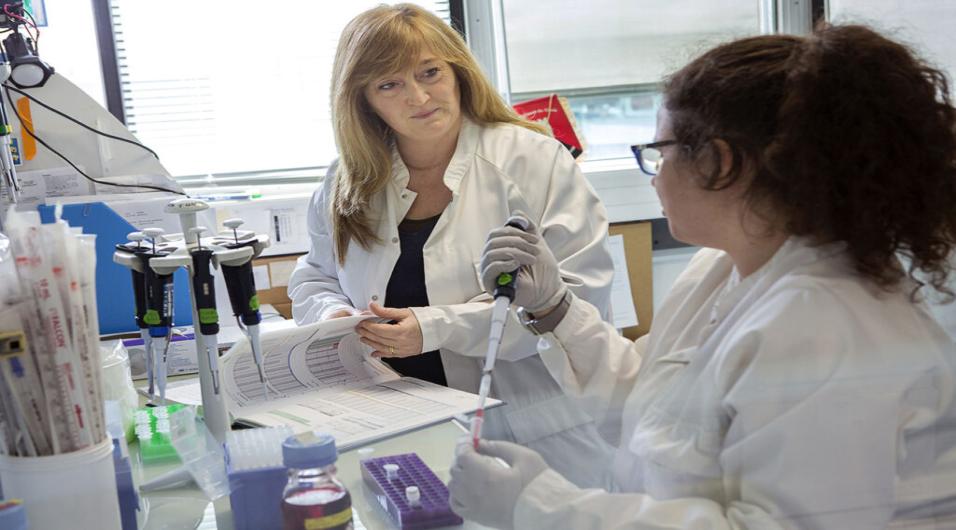
Biotechnology Companies
Roles and Responsibilities
In the dynamic field of biotechnology, genetic engineers play a crucial role in advancing scientific knowledge and developing new applications for genetic information. Their daily tasks are diverse and often involve preparing and analyzing genetic tissue samples in a laboratory.
This entails recording and interpreting the results from various experiments and tests, which are essential for understanding genetic structures and functions. Additionally, genetic engineers frequently develop computer models to simulate genetic processes and predict outcomes, enabling more precise and effective interventions. These responsibilities require a strong foundation in molecular biology, genetics, and bioinformatics, highlighting the interdisciplinary nature of the work.
Top Employers in the Industry
When it comes to employment opportunities, several top-tier biotechnology companies and organizations are known for hiring genetic engineers. Pharmaceutical giants, healthcare organizations, and dedicated research and development firms are among the primary employers in the industry.
Universities and government agencies also offer significant opportunities for genetic engineers, providing a platform for both academic research and practical applications. Notable employers include companies like Genentech, Amgen, and Biogen, which are at the forefront of biotechnological advancements. These organizations not only provide cutting-edge facilities but also foster an environment that encourages continuous innovation and professional growth.
Required Skills and Qualifications
To secure a position as a genetic engineer in a competitive biotechnology company, certain skills and qualifications are indispensable. A life science degree or a postgraduate master's qualification in genetics or a related subject is typically required.
In addition to formal education, candidates must possess a keen interest in science and technology, along with a robust academic background. Practical experience in laboratory settings, proficiency in bioinformatics tools, and the ability to stay abreast of the latest scientific developments are also crucial. These skills ensure that genetic engineers can effectively contribute to their field, driving forward research and application in genetic engineering.
Pharmaceutical Industry
Drug Development and Testing
Genetic engineers play a crucial role in drug development and testing within the pharmaceutical industry. They are responsible for manipulating genetic material to study the effects of new drugs on specific genes, which can lead to the development of more effective and personalized medications.
This process involves using techniques such as CRISPR/Cas9 to edit genes and observe the resultant changes in cellular behavior. Genetic engineers also collaborate with pharmacologists and biochemists to design experiments that test drug efficacy and safety. These contributions are vital for the creation of novel therapies that can address diseases at the genetic level, offering hope for conditions that were previously deemed untreatable.
Major Pharmaceutical Companies Hiring Genetic Engineers
Several major pharmaceutical companies actively hire genetic engineers to enhance their research and development capabilities. Companies like GlaxoSmithKline (GSK), Pfizer, and Novartis are continuously seeking skilled professionals in human genetics, computational biology, and functional genomics.
These organizations provide opportunities to work on cutting-edge projects aimed at discovering new treatments for a wide range of diseases. For instance, GSK's therapeutic areas include oncology, immunology, and infectious diseases, where genetic engineers contribute by identifying genetic markers and developing targeted therapies. The demand for genetic engineers in these settings underscores the importance of their expertise in advancing medical science and improving patient outcomes.
Career Advancement Opportunities
Career advancement opportunities for genetic engineers in the pharmaceutical industry are abundant and diverse. Entry-level positions often involve hands-on laboratory work, where individuals gain practical experience and develop technical skills under the guidance of experienced professionals.
As genetic engineers progress in their careers, they can move into senior roles such as project managers, research directors, or specialized consultants. Additionally, continuous professional development is encouraged, with many organizations offering training programs and funding for further education, including Master's or PhD degrees.
Joining professional societies like The Genetics Society can also provide networking opportunities and access to the latest industry developments, further enhancing career growth prospects.
Academic and Research Institutions
Research Projects and Grants
Research projects and grants play a pivotal role in the career of a genetic engineer within academic and research institutions. These projects often focus on groundbreaking studies, such as the modification of genetic material to understand and manipulate hereditary information better.
The opportunity to lead or participate in these projects is usually available to those who have completed advanced education, such as a Ph.D. in genetic engineering or related fields. Securing funding through grants is another critical aspect, with numerous organizations offering financial support to facilitate these research endeavors. For instance, the Genetics Society provides various grants to students and early-stage researchers, allowing them to pursue innovative genetic research.
These grants are essential for advancing scientific knowledge and for the professional development of genetic engineers, as they enable the acquisition of resources and tools required for sophisticated genetic studies.
Teaching and Mentoring Roles
Teaching and mentoring roles are also significant components of a genetic engineer's career in academic and research institutions. These roles often involve lecturing on complex topics such as molecular biology, genetic modification techniques, and bioinformatics.
By teaching undergraduate and graduate students, genetic engineers help cultivate the next generation of scientists and researchers. Additionally, mentoring students and junior researchers in laboratory settings is a critical responsibility. This mentorship extends beyond mere instruction; it includes guiding students through the intricacies of experimental design, data analysis, and scientific writing. Such roles not only contribute to the academic growth of students but also enhance the professional development of the genetic engineers themselves, as they stay updated with the latest advancements and continually refine their knowledge and skills.
Collaboration with Other Scientists
Collaboration with other scientists is another integral aspect of working as a genetic engineer in academic and research environments. Genetic engineers often work as part of multidisciplinary teams, collaborating with professionals such as clinical scientists, genetic technologists, microbiologists, and biochemists.
This collaborative approach is crucial for the advancement of genetic research, as it brings together diverse expertise and perspectives, fostering innovation and comprehensive understanding. For instance, in a gene-editing project, a genetic engineer might work closely with a biochemist to understand the biochemical pathways involved and with a clinical scientist to assess the potential medical applications.
Such collaborations not only enhance the quality and scope of research but also provide genetic engineers with valuable insights and knowledge from related fields, thereby broadening their professional capabilities and contributing to the overall progress of genetic sciences.
Government Agencies
Policy Development and Regulation
Genetic engineers play a crucial role in policy development and regulation within government agencies. These professionals are responsible for creating and enforcing policies that govern the use of genetic engineering technologies, ensuring ethical standards and public safety are upheld. For instance, they may work on guidelines related to gene editing in crops or medical applications, balancing innovation with ethical considerations. By specializing in fields such as bioinformatics, agricultural science, or medical ethics, genetic engineers can significantly contribute to the formulation of comprehensive policies that address the complexities of genetic research and its applications.
This involvement not only helps in maintaining public trust but also in fostering a regulated environment where scientific advancements can thrive responsibly.
Research and Development in Public Sector
In the public sector, genetic engineers engage in extensive research and development to advance scientific knowledge and develop new technologies. Working in government-funded laboratories or research institutions, they often focus on projects that may not have immediate commercial applications but are crucial for long-term societal benefits. For example, genetic engineers might study genetic mutations and their impact on diseases, aiming to develop preventive measures or treatments. These roles often offer a clearly defined career pathway with opportunities for further specialization and leadership within various departments.
The research conducted in these settings is essential for the foundational understanding of genetic mechanisms, which can later be translated into practical applications by both public and private sectors.
Impact on Public Health and Safety
The impact of genetic engineering on public health and safety is another significant area where government agencies employ genetic engineers. These professionals assess the potential risks and benefits of genetic technologies, such as GMOs or gene therapies, to ensure they do not adversely affect human health or the environment. For example, they might evaluate the long-term effects of genetically modified crops on food safety and food security, considering the potential for gene transfer to conventional crops.
By conducting thorough risk assessments and developing safety protocols, genetic engineers help to mitigate potential hazards, thereby protecting public health and maintaining ecological balance. Their work is pivotal in ensuring that genetic advancements contribute positively to society without compromising safety standards.
Agricultural Sector
Genetic Modification of Crops
Genetic engineering has significant applications in the agricultural sector, particularly in the genetic modification of crops. This process involves inserting DNA into the genome of an organism to produce genetically modified (GM) plants, which can enhance the production value of crops [6]. By transferring new DNA into plant cells, genetic engineers can develop crops that are more resistant to pests, diseases, and environmental conditions.
This not only leads to higher yields but also reduces the need for chemical pesticides, promoting a more sustainable approach to agriculture. The benefits of GM crops are evident in various countries, including the USA, Argentina, China, and Mexico, where farmers have reported increased productivity and economic gains.
Companies Specializing in Agricultural Biotechnology
Companies specializing in agricultural biotechnology are at the forefront of developing innovative solutions to improve crop performance and sustainability. These firms employ genetic engineers to work on the genetic enhancement of plants, focusing on traits such as drought tolerance, pest resistance, and improved nutritional content.
Some notable companies in this field include Monsanto, Syngenta, and Bayer, which invest heavily in research and development to create new GM crop varieties. Job opportunities for genetic engineers in these companies are abundant, as they continually seek skilled professionals to advance their genetic modification projects.
Additionally, research centers and government agencies also play a crucial role in regulating and supporting the development of GMOs, ensuring that they meet safety and ethical standards.
Environmental and Ethical Considerations
Environmental and ethical considerations are paramount in the field of agricultural biotechnology. Genetic engineers must navigate complex ethical landscapes, addressing concerns such as privacy, consent, and the potential unintended consequences of genetic modifications.
The Royal Society emphasizes the importance of ethical practices in genetic engineering, advocating for a balanced approach that considers both the benefits and risks of GM crops. Furthermore, environmental implications, such as the impact of GM crops on biodiversity and ecosystem health, require careful assessment and management.
By adhering to ethical guidelines and conducting thorough environmental impact studies, genetic engineers can contribute to a more responsible and sustainable future for agricultural biotechnology.
Conlcusion
In conclusion, genetic engineers have a diverse range of career options available to them across various industries. Whether it be working in biotechnology companies, the pharmaceutical industry, academic and research institutions, government agencies, or the agricultural sector, genetic engineers play a crucial role in advancing scientific knowledge and technological innovations. By possessing a unique set of skills and qualifications, genetic engineers can contribute to groundbreaking research projects, drug development, policy regulations, and even the genetic modification of crops.
With the continuous growth and development in the field of genetics, the opportunities for genetic engineers are expanding, offering a promising and rewarding career path for those passionate about making a difference in the world of science and technology.







